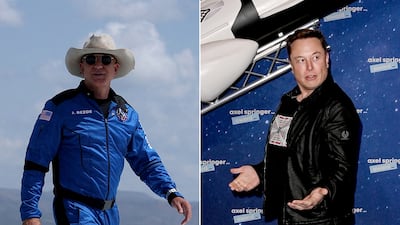Space tourism has a lot of positives and can help inspire humanity to protect their planet, says UN space chief Simonetta Di Pippo.
The director of the United Nations Office for Outer Space Affairs, Ms Di Pippo said increased access to space would make it 'a part of our lives'.
The comments were made days after Prince William, the Duke of Cambridge, suggested saving the Earth should come before space tourism. He told the BBC: “Great brains and minds should be trying to repair this planet, not trying to find the next place to go and live”.
Ms Di Pippo, who was visiting the Italian pavilion at Expo 2020 Dubai on Monday, told The National that space tourism could benefit humanity in many ways.
“It's really the attempt of bringing space closer to humanity and humanity closer to space.
"Space would become something that’s outside, dark, cold and far away, but part of our lives."
On October 13, Star Trek actor William Shatner became the oldest person to go into space aboard a Blue Origin tourism flight.
Richard Branson and Elon Musk are also working on businesses that would take humans to space recreationally.
When asked about space tourism flights by billionaires Ms Di Pippo said she sees a lot of positives to the progress being made in space exploration, and that it will allow people to look back on Earth and recognise its fragility.
“So, we have to work a lot in terms of the sustainability in space, but also on earth. We have [to] try and work on issues related to climate and help the planet survive in the best way possible.
“We can really improve the quality of life for people on Earth, thanks to space.
"I believe that if we have more and more people experiencing what space means, it can also help in policy and decision-making processes towards supporting space.”
Science experiments could also become a regular part of space tourism flights.
Sirisha Bandla, an aeronautical engineer, took a plant experiment with her when she flew on board a Virgin Galactic space tourism flight in July.
The experiment helped to measure how well passengers would be able to perform scientific activities during the 90-minute flight.
“Bandla will activate three plant-filled tubes to release a preservative at critical data-collection stages during the flight: at 1g (Earth gravity level) before the rocket boost, just before entering microgravity, and after the conclusion of microgravity,” Nasa said.
Ms Di Pippo also believes space tourism could help inspire people to create more spin-off technologies.
Space research and tech have helped advance many vital sectors, particularly in medicine and science.
From vaccine development and purifying water to improving baby formula, space technologies and research have been a huge benefit to life on Earth.
Since 1976, Nasa has recorded more than 2,000 space-related projects that have been commercialised and brought to the market.
These include creations such as invisible braces, water purification systems, ear thermometers and wireless headphones.
“The number of satellites that each of us is using every day is really huge - when we check the weather in the morning, access the Global Navigation Satellite Systems to move from point A to point B, develop smart agricultural procedures, do telemedicine or biodiversity – everything [involves] space,” said Ms Di Pippo.
































